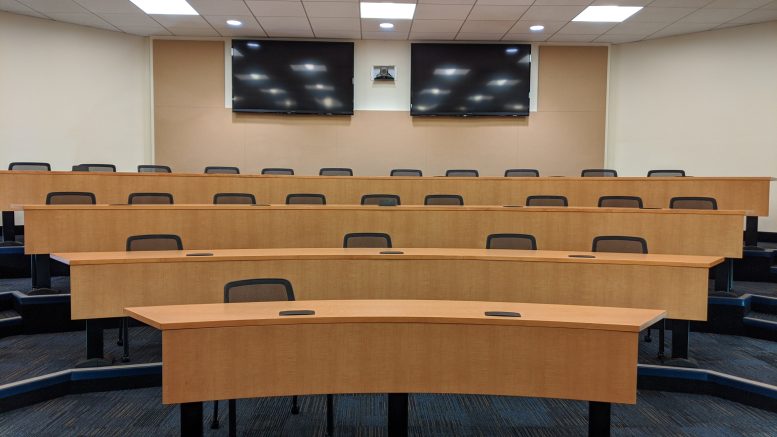Elise Gregg | Editor-in-Chief
Faculty Senate is back in session.
At the top of a rather crowded agenda on Jan. 17 was something that happened during the senate’s recess: the Cuban Research Institute’s chaotic “Cuban Privilege” panel.
Faculty discussed the book signing, which became a panel, focusing on the disarray that preceded it and the implication for future academic events. FIU president Ken Jessell answered senators’ questions.
“If we have something that’s controversial, why would we want to do it simply as a book signing and having a presentation, rather than having a very strong academic dialogue?” Jessell asked although much of the speech surrounding the event focused little on Dr. Susan Eckstein’s actual research in her book.
Jessell concentrated most of his answers on the logistics of why FIU ended up changing the event and switching locations.
“There were a lot of issues with the security, the ability of Coral Gables to even accommodate the traffic…what this would mean to Books and Books longer term, in terms of loss of business,” said Jessell within the first ten minutes of the senate. “I can’t make decisions on the basis of all of those things, but I can make decisions in terms of the safety and security of the university community, as well as the broader community, and this was a way of accommodating that without diminishing the importance of free speech.”
However, that wasn’t the heart of the issue for some faculty members. Instead, they centered on an issue that has been a common theme in recent history: academic freedom.
“What concerns me is that in my 23 years at FIU, I had never seen a CRI event changed because of the unpopular opinion among our community,” said MMC library senator Patricia Pereira-Pujol. “If the event had started as a panel discussion on what immigration means, who was an immigrant, who was not, what is the difference…then it would have been fine, but it wasn’t that and it was changed into that to accommodate people who…I believe, are not very open to listening to opinions that differ from theirs.”
“If we’re addressing academic freedom, then by all means, please have more events like this where we discuss all the different research that is being done and all the different ideas, but this was not it.”
Jessell claimed that Eckstein approved the change and that FIU had discussed it with her beforehand. However, Eckstein said in an interview with PantherNOW that that wasn’t fully the case.
“I really was not given an option on the format: I was told that this was the format that it would take,” said Eckstein, who only communicated with Dr. Jorge Duany, director of the CRI, not the president’s office. “I didn’t have a choice in who the speaker would be. They chose him – and I don’t know exactly who ‘they’ is.”
Eckstein said that the way that the other panelist talked was inappropriate, given that he hardly touched on her book, and she was not given much of a chance to respond to his claims. Still, she said she appreciated FIU giving her the chance to speak and the security and effort administration put into the evening.
Jessell promised senators that the handling of the December panel was a one-time thing and that it would not be the standard for future events.
“Let’s not make this a precedent,” said Jessell. “This is a one-time event and let’s try to be more deliberate in what we’re doing.”
Yet again, the concerns seemed lost in translation – it wasn’t the speed with which things were changed or the venue itself, but more so the inability of Eckstein to speak freely that concerned senators.
“Now it would seem that any organization that is loud enough could force us into doing a big event, ‘even handed’ presentation and that sort of goes to academic freedom,” said CARTA Senator Neil Reisner.
Reisner proposed a resolution to urge the administration from intervening in academic events in the future, objecting to administrators having done so with the CRI panel.
After a few minor adjustments to the language, mainly clarifying the specific concerns the senate had, the resolution passed.
“Be it resolved, the Senate urges the administration to refrain from such interventions in the future and ask for explanations on this action in this instance,” stated the resolution.
After the discussion with Jessell ended, senators ran through the rest of the agenda, starting with a report from Chair Deanne Butchey.
Her report varied in topics, from faculty participation in commencement to trends in using AI for academic misconduct and exemptions for exam and assignment materials from public disclosure.
After those, Chair Deanne Butchey concluded her report with requests for information from Florida’s public university system about how resources are being used on programs connected to diversity, equity and inclusion as well as critical race theory.
“The advisory council of the faculty Senate held an emergency meeting last week to make a comprehensive statement made by the organization,” said Butchey. “We feel that a statement by the body at large would be more impactful than numerous individuals. Once the working group completes the statement we will share, but it is a rapidly evolving situation.”
Provost Elizabeth Bejar had a few updates of her own in her report, notably that the search and screening committee has been appointed for the SIPA dean search, which had its first meeting that week.
“We selected Isaacs and Miller as our search firm and Dr. Rosenbaum…has graciously agreed to facilitate a listening session with the SIPA faculty… as well as search and screening committee members, and that will be held on Thursday the 19th,” said Bejar. “Our goal is to have an expeditious but increased efficacy in the process of our search and selection for a dean.”
FIU will use the same search firm for the library dean search, finalizing the details of that search in the near future.
The senate also passed several motions, approving several new programs:
- Undergraduate Certificate in Creative Digital Filmmaking
- Undergraduate Certificate in Korean Studies
- Graduate Major: Master of Public Health in Global Health






Be the first to comment on "Faculty Senate discusses CRI Panel and academic freedom"